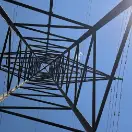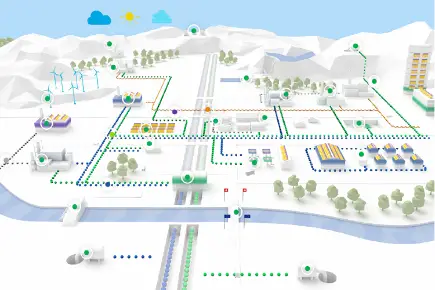
GASAG
Erdgas AG Laufental-Thierstein (GASAG) was founded on 20 August 1993. It operates installations for reliably supplying private and public buildings with natural gas and biogas at the most favourable conditions. The company also operates a natural gas filling station in Laufen.
Its shareholders include EBM (Genossenschaft Elektra Birseck) as well as the municipalities of Breitenbach, Büsserach, Dittingen, Meltingen and Zwingen and the town of Laufen. Primeo Energie also has a mandate to manage the business and operations and is responsible for consulting and planning as well as for technical and administrative processes.
GASAG focusses on biogas
The course is set for biogas
The proportion of biogas should be 100 per cent by 2050 and at least 40 per cent by 2030 as an interim step. Biogas has the potential to make a significant contribution to reducing CO2 emissions. As a result, Erdgas AG Laufental-Thierstein (GASAG) has been offering its customers biogas since 2012. From 2024, 10 per cent biogas from the region will generally be blended into the standard natural gas product. According to GASAG's Board of Directors, this proportion will be increased to at least 40 per cent by 2030. The aim is to achieve a 100 per cent renewable gas supply by 2050.
The municipalities supplied by GASAG are thus laying the foundations for the continued secure supply of all customers connected to the gas network and for achieving the climate targets set by the federal government. The biogas comes from the region and is produced from green waste, leftover food from the catering industry and other biogenic waste in Pratteln. Other sources of biogas will soon follow.
Information on the current gas supply
The gas supply in Switzerland is currently guaranteed. GASAG has already procured the quantities for next winter. An increasing proportion of biogas is planned for the future.
According to the Association of the Swiss Gas Industry (VSG), Switzerland's natural gas supply is currently secure.
To secure supplies for the winter, the Federal Council instructed the regional gas companies as a community to procure additional quantities and build up gas reserves. This includes the procurement of gas, additional gas storage capacities (15 per cent of annual domestic consumption), liquefied natural gas (LNG) and terminal capacities for LNG.
The Federal Council is once again setting a voluntary gas savings target of 15 per cent for the upcoming winter half-year (October to March).
The Swiss gas industry has no direct contracts with Russia. Procurement takes place directly and primarily on the markets in Germany, the Netherlands, France and Italy. The Swiss gas industry has no influence on the supply mix of the respective upstream suppliers. Gas accounts for 15 per cent of total energy consumption in Switzerland.
You can find more information on the origin of the gas here.
LNG is the abbreviation for liquefied natural gas. This refers to liquefied natural gas. The liquid aggregate state is achieved at a temperature of -162°C. The gas is compressed by a factor of 600 and can be transported on ships with a high energy density. The gas is compressed by a factor of 600 and can be transported on ships with a high energy density. It usually comes from Qatar, the USA and Australia. There are around 40 unloading terminals along the west coast of Europe, where the LNG is fed back into the existing pipelines in gaseous form.
In the event of a gas shortage in Switzerland, a national economic supply concept will be implemented that provides for measures by the Crisis Intervention Organisation (KIO) to reduce demand in several stages. These include austerity measures, ordering dual-fuel systems to switch to oil and, in an emergency, imposing quotas on large gas consumers.
Further information can be found here.
GASAG is working to secure biogas resources from the region. As the proportion of local resources increases, dependence on foreign countries is reduced and the proportion of renewable energy from biogenic waste materials grows.
The Board of Directors of GASAG, in which the municipalities supplied have a stake, has adopted a biogas strategy. From 2024, 10 per cent biogas will be fed in, and from 2025, 15 per cent. By 2030, the proportion of biogas is to be steadily increased to 40 per cent and net zero by 2050.
Following the high in summer 2022, gas market prices have fallen again. However, not to the long-term level of previous years.
After a price reduction on 1 January 2024, the Board of Directors of GASAG has decided on a further price reduction for the overall tariff (energy, grid, taxes) for all tariff categories. It will apply from 1 January 2025. However, grid costs will have to be increased due to higher expenses. All customers will be informed by letter.
Downloads

GASAG
c/o EBM (Genossenschaft Elektra Birseck)
Weidenstrasse 27
CH-4142 Münchenstein


